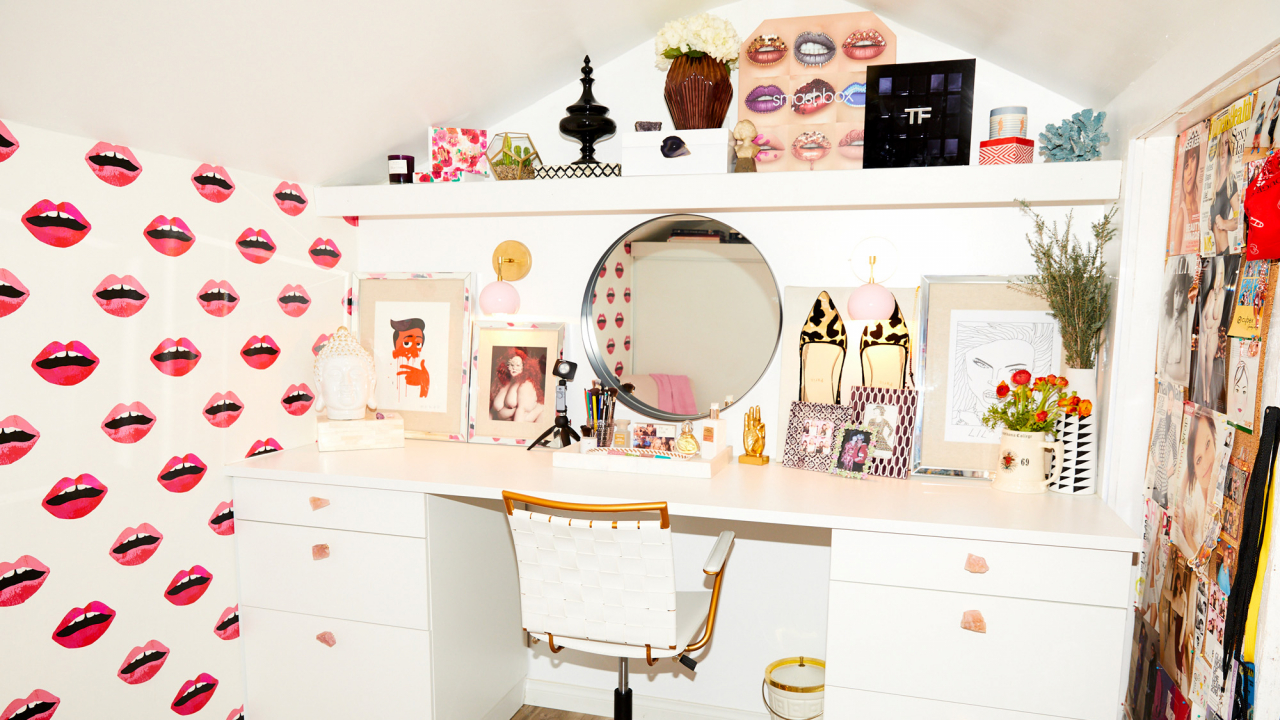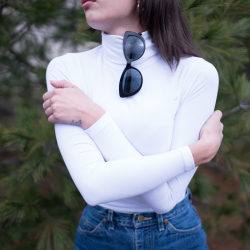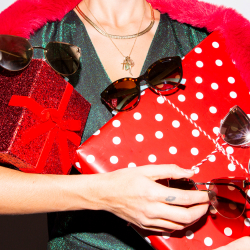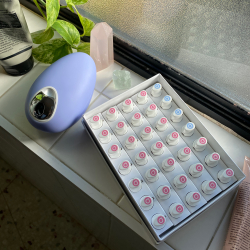
2020, the Year the Beauty Industry Radicalized Me
This year sucked. The beauty industry isn’t blameless.
If 2020 taught me anything, it’s that everything sucks, including the beauty industry. I wish I could put that more eloquently, but I can’t. I’m sorry. I’m tired.
I started to suspect 2020 would be a total suckfest in February. That’s when I crammed all my silly little things—clothing and coffee mugs, half-empty moisturizers—into my Chevy Malibu and left my husband. He’d had a lot of thoughts about what I should do with my face; thoughts like “go on medication already” to erase my acne, or “put some makeup on,” goddamnit.
The constant comments felt normal, for the most part. Familiar. You’re not pretty enough, you’re not skinny enough, your skin isn’t clear enough, young enough, or poreless enough. These products can help! Turns out beauty marketing and psychological abuse have a lot in common. Who knew?
Anyway, after two years of feeling generally ugly/worthless/weepy, I got angry. Angry at him, yes, but also at patriarchy. Gender norms. The bullshit beauty standards that brainwashed both of us, all of us—employers, judges, juries, the government—into equating a woman’s appearance with her inherent worth. The beauty industry that sells us these standards. The go-girl brand of feminism (Now Conveniently Compatible with Capitalism!™) that insists buying into them is empowerment. I was so angry and sick and tired of it all. I was ready to rage against the media marketing machine.
Then the world ended.
Or rather, These Unprecedented Times started, marked by the coronavirus pandemic and its quarantines. To be clear, there is nothing good about These Unprecedented Times. But back then, if I could see one teeny, tiny sliver of a silver lining, it was that surely the pressure to keep up appearances would ease in isolation. Maybe we’d learn to love our bare, un-Botoxed faces. Socially distance from society’s expectations. Use less, need less, want less.
Alas, that did not happen. In a frantic flurry of articles and Instagram posts, the pressure to perform beauty just…kept…coming. DIY Brazilians and bang trims. Everything you need to know about extending the life of your lip fillers. Why applying makeup every morning, even in lockdown, can boost your confidence. That’s what I’m supposed to do with all this alone time? I thought. Dig into an eyeshadow palette until I hit pan, as if that were a perfectly acceptable place to find confidence?
Then it dawned on me—dystopian, absurd, obvious: It wasn’t about stimulating confidence. It was about stimulating the economy. And as 2020 has made abundantly clear, the industry, like the government, puts wealth ahead of well-being.
Women are worth more, economically, when we’re buying into beauty standards. Just look at the things we chase! Perma-youth, poreless skin—unachievable goals, goals that require endless upkeep, goals that ensure we are constant consumers. Finding beauty in our skin, our faces, our bodies as they are threatens that system.
Of course, in a cosmetic catch-22, threatening the capitalist economy means threatening the livelihoods of the individuals who make up the economy, a risk we’ve all had to weigh at some point in the past year: To dine out at a restaurant and save local businesses, or to stay home and save lives? I can see no satisfying way for private citizens to simultaneously support all those who work in the beauty industry and sledgehammer the capitalist, patriarchal, white-supremacist foundation it’s built on.
That white-supremacist foundation—the centuries of positioning of beauty as goodness and beauty as whiteness, the appropriation of Black features on white bodies, the proliferation of skin-lightening products, the promotion of diet culture—helped create the conditions that allowed for some of the most awful tragedies of the entire, awful year: the murders of Breonna Taylor, George Floyd, and at least 164 Black lives at the hands of the police. Put plainly, Eurocentric beauty standards and systemic racism are inextricably and inexcusably intertwined.
But wait, there’s more!
While xenophobia ran rampant throughout the United States, makeup enthusiasts fueled racism with the “fox eye” trend, an appropriation of East Asian eyes (“another example of Eurocentric mainstream culture cherry-picking ethnic features to look ‘cool,’ while still treating and viewing the ethnicity in question as their inferiors,” as reported by The Daily Targum).
While Amazon exploited vulnerable workers during the coronavirus pandemic and CEO Jeff Bezos almost single-handedly widened the wealth gap, beauty media published Amazon Prime Day round-ups.
While the climate crisis escalated, personal-care corporations topped the 2020 Top Global Plastic Polluters list, despite the fact that many conglomerates met almost all of the sustainability goals they set in place over the past decade. (They have set new sustainability goals for 2030, which you can review here and here.)
My takeaway? When the beauty industry continues business as usual, the world continues business as usual, and unless you are billionaire Jeff Bezos, I think we can agree that the world cannot and should not continue business as usual. Business as usual is literally killing us.
The brightest spots in beauty this year have been rebellions against business as usual.
Sharon Chuter, founder of UOMA Beauty, launched Pull Up For Change, a non-profit organization that pushes for “economic opportunities for Black people around the world.” Aurora James, founder of Brother Vellies, created the 15 Percent Pledge, an organization that holds corporations accountable to anti-racism by asking them to pledge “15 percent of their shelf space to Black-owned businesses.” Glossier funneled $500,000 into its Grant Initiative for Black-Owned Beauty Businesses. A number of beauty brands partnered with I Am A Voter to encourage voter participation in the 2020 presidential election.
These initiatives are incredible and inspiring, but they are not enough. The beauty world at large—corporations and consumers, editors and influencers, indie brands and executive boards, everyone—has to commit to the work.
If we want a better beauty industry in 2021, it has to move beyond inclusive marketing campaigns and diverse foundation shades. It has to push past consumption as activism and performative self-care. It has to include community care and climate activism, racial and social justice, policy reform, and protest. Above all, it has to advocate for the abolition of the outdated, oppressive systems it props up.
Want more stories like this?
20 Beauty Products I Actually Finished in 2020
Chronic Skin Irritation? Your Laundry Detergent Might Be to Blame
This Clean, Textured Hair Care Brand Caught the Eye of Issa Rae—She’s Now Co-Owner







